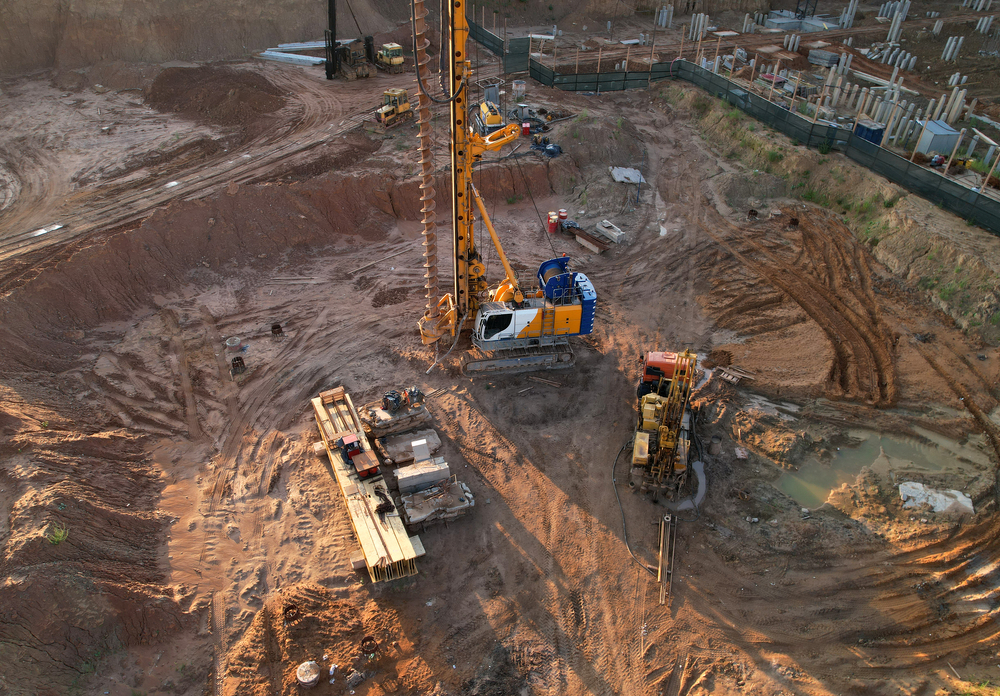The Main Principles Of Geotheta
The Main Principles Of Geotheta
Blog Article
The 8-Second Trick For Geotheta
Table of ContentsNot known Facts About Geotheta6 Simple Techniques For GeothetaGeotheta - TruthsNot known Incorrect Statements About Geotheta The smart Trick of Geotheta That Nobody is Discussing

They perform website investigations, gather examples, carry out lab tests, and assess information to assess the viability of the ground for building jobs - Geo Tech Engineering. Based on their findings, geotechnical designers supply recommendations for structure layout, slope stability, keeping structures, and mitigation of geotechnical threats. They collaborate with other experts, such as architects, architectural designers, and building and construction teams, to make sure that geotechnical factors to consider are incorporated into the overall task layout and implementation
By evaluating the behavior and residential properties of dirt and rock, they can determine potential geotechnical risks such as landslides, dirt settlement, or incline instability. Their know-how aids protect against failures or mishaps that might endanger lives and building. Below are some detailed duties and duties of a geotechnical engineer: Website Examination: Geotechnical designers conduct site investigations to collect information on subsurface conditions.
They interpret the information to recognize the buildings and actions of the dirt and rock, including their strength, permeability, compaction qualities, and groundwater problems. Geotechnical Evaluation and Style: Geotechnical designers assess the data collected throughout site examinations to examine the security and viability of the website for building tasks. They perform geotechnical calculations and modeling to review aspects such as bearing capability, negotiation, slope stability, side planet pressures, and groundwater flow.
The Basic Principles Of Geotheta
Foundation Layout: Geotechnical designers play a vital role in designing structures that can securely support the intended structure. They examine the soil conditions and tons requirements to identify the suitable foundation kind, such as shallow structures (e.g., footings), deep foundations (e.g (https://www.dreamstime.com/ianhammond2191_info)., stacks), or specialized strategies like dirt renovation. They consider elements such as negotiation restrictions, bearing capacity, and soil-structure interaction to create optimum structure designs
They examine building and construction plans, screen site tasks, and conduct area inspections to verify that the layout referrals are followed. If unforeseen geotechnical issues emerge, they evaluate the scenario and give recommendations for removal or modifications to the design. Risk Analysis and Mitigation: Geotechnical engineers analyze geotechnical threats and risks related to the task website, such as landslides, liquefaction, or dirt disintegration.

Collaboration and Interaction: Geotechnical designers function carefully with various other specialists included in a project, such as architects, architectural engineers, and construction teams. Effective interaction and cooperation are important to integrate geotechnical considerations into the overall project design and construction procedure. Geotechnical engineers provide technological competence, answer inquiries, and make sure that geotechnical demands are met.
What Does Geotheta Mean?
Here are some kinds of geotechnical designers: Foundation Engineer: Structure engineers concentrate on creating and analyzing structures for structures. They assess the dirt problems, tons needs, and website attributes to establish the most proper foundation type and design, such as superficial foundations, deep foundations, or specialized strategies like heap foundations.
They evaluate the factors affecting slope stability, such as dirt properties, groundwater conditions, and slope geometry, and develop techniques to avoid incline failings and reduce dangers. Quake Engineer: Earthquake designers concentrate on assessing and making frameworks to hold up against seismic forces. They evaluate the seismic risk of a website, examine dirt liquefaction potential, and develop seismic layout standards to make certain the safety and security and resilience of frameworks throughout earthquakes.
They do area screening, accumulate examples, and analyze the accumulated data to identify the dirt properties, geologic formations, and groundwater conditions at a site. Geotechnical Instrumentation Engineer: Geotechnical instrumentation engineers concentrate on tracking and determining the behavior of soil, rock, and frameworks. They install and preserve instrumentation systems that keep track of factors such as soil settlement, groundwater levels, slope motions, and structural variations to examine performance and provide early cautions of possible problems.
Not known Details About Geotheta
They carry out examinations such as triaxial examinations, consolidation tests, straight shear examinations, and leaks in the structure examinations to gather data for geotechnical evaluation and design. Geosynthetics Engineer: Geosynthetics designers concentrate on the layout and application of geosynthetic products, such as geotextiles, geogrids, and geomembranes. They use these products to boost dirt security, reinforce inclines, provide drain services, and control erosion.
They tend to be investigative people, which indicates they're intellectual, introspective, and analytical. They are curious, systematic, logical, analytical, and logical. Some of them are also social, meaning they're kind, generous, participating, person, caring, helpful, compassionate, skillful, and friendly - Consulting Engineers.
In the office environment, geotechnical designers use specialized software application tools to perform estimations, produce designs, and assess information. They prepare reports, evaluation project requirements, connect with customers and staff member, and coordinate project tasks. The workplace setting supplies a helpful atmosphere for research, evaluation, and partnership with other specialists check that associated with the job.
About Geotheta
They frequently see job websites to conduct website examinations, assess geotechnical problems, and gather information for analysis. These brows through involve traveling to various areas, often in remote or tough terrains. Geotechnical designers may carry out dirt tasting, conduct tests, and screen construction activities to ensure that the geotechnical aspects of the job are being carried out appropriately.
Geotechnical designers also work in specialized geotechnical research laboratories. Geotechnical laboratory engineers function extensively in these atmospheres, taking care of screening tools, running instruments, and tape-recording data.
Report this page